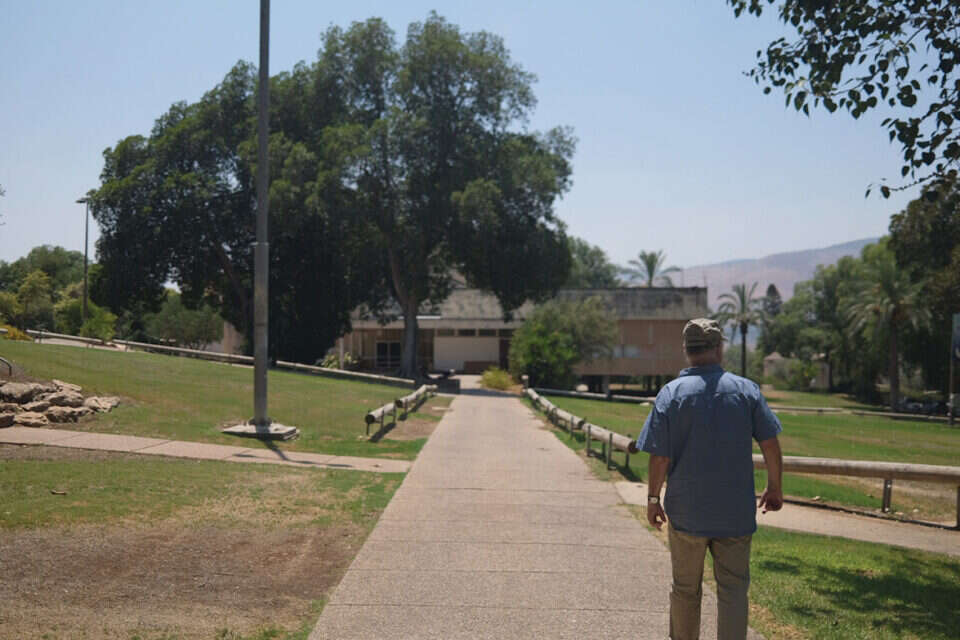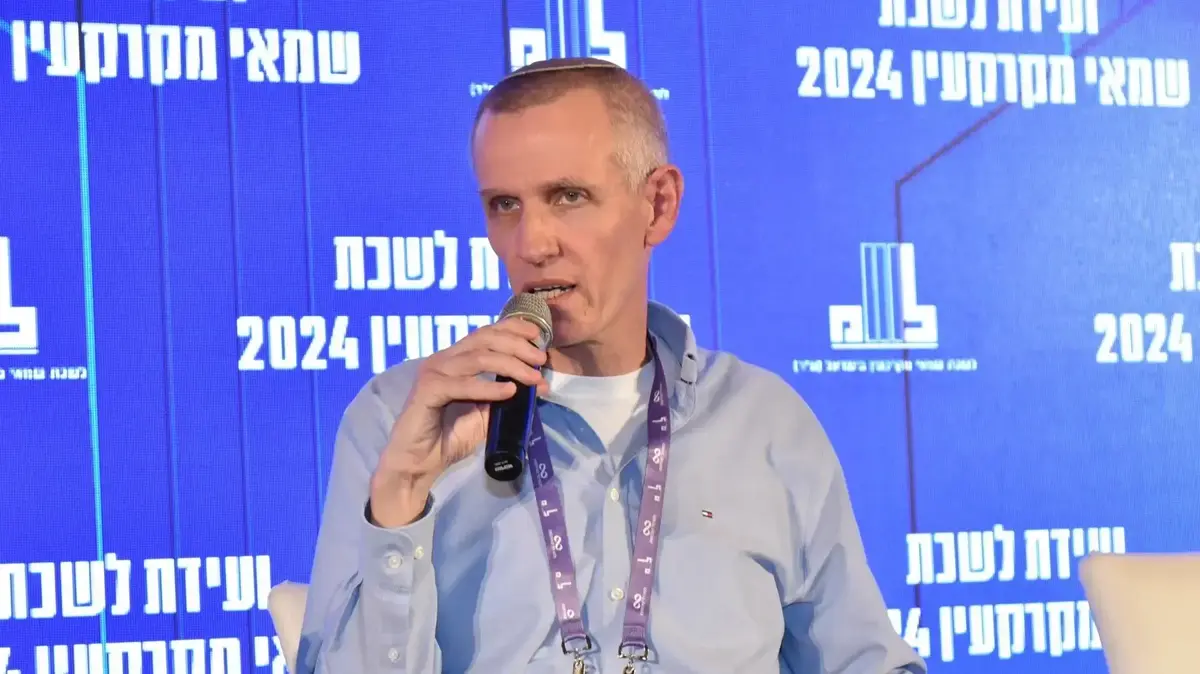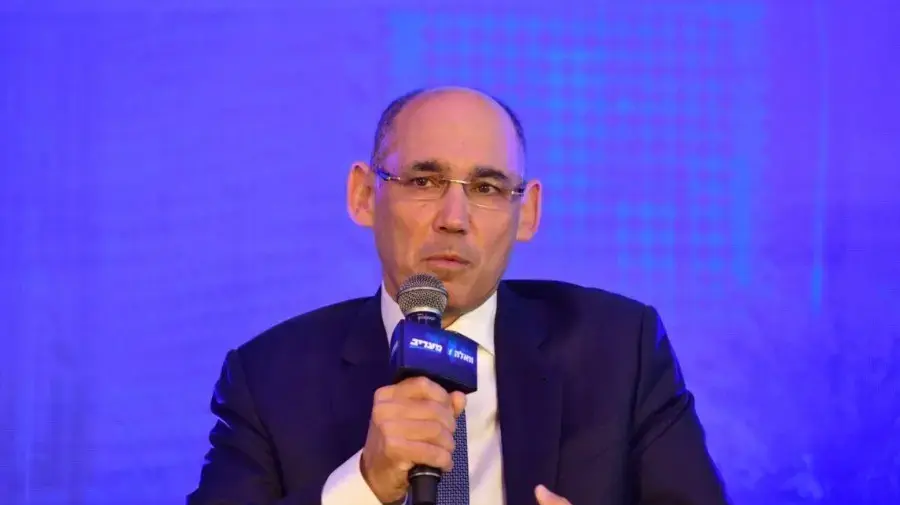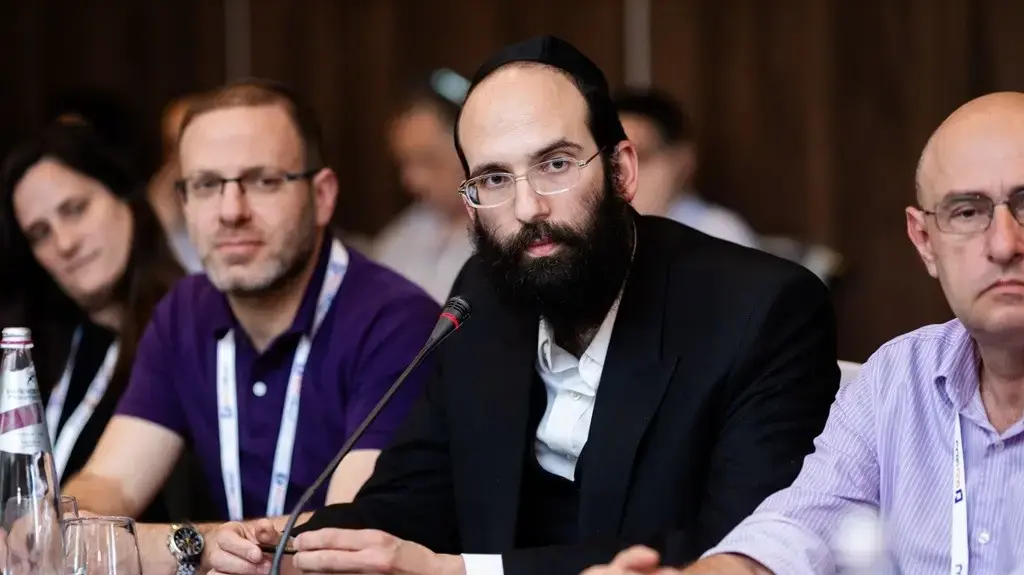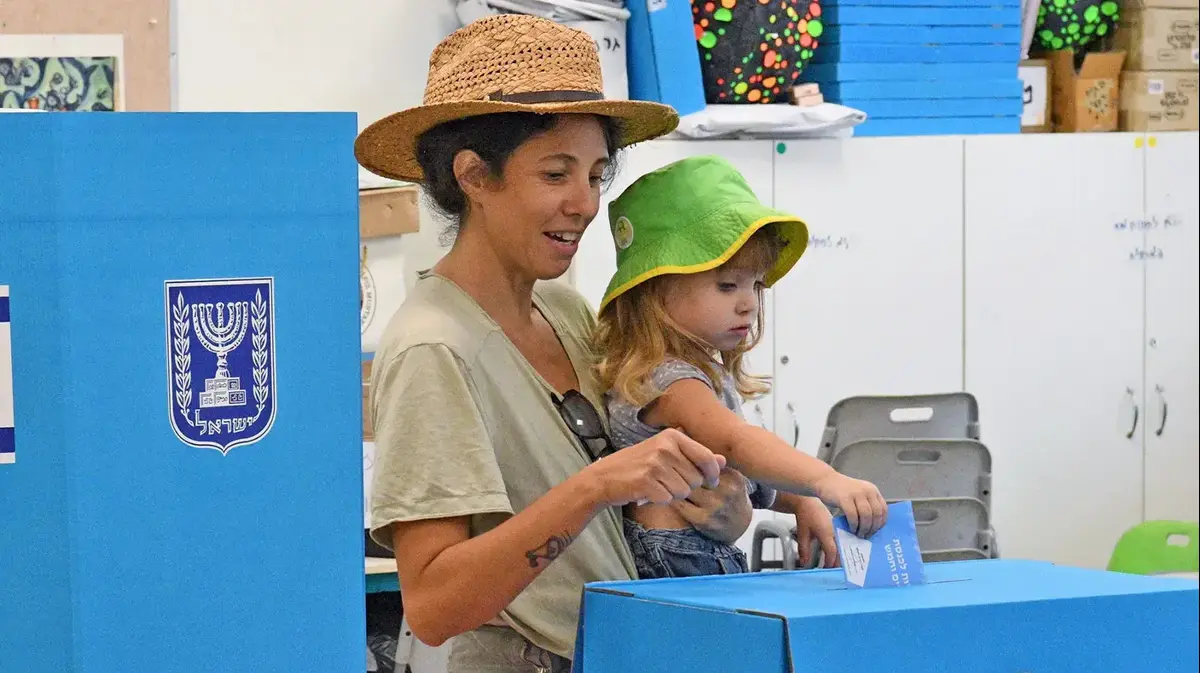It is impossible to protect the kibbutz from its members," veteran journalist Shlomo Glazer told me at the beginning of the week as we sat on a low, designed concrete railing in the plaza of the dining room in the center of Nir David. The stream flowed slowly. But the air did not move. His intention was that when the members choose to follow a certain path , the familiar frameworks that make up any "kibbutz" - will move aside. "We changed the system for our parents by 180 degrees," he said of the privatization, a process that ended a long time ago. As for the social network of solidarity and mutual help, he has no choice but to trust that Let there not be a rebellion like he and his friends led: "I hope our children will continue the way we brought them up."
The political tension in the kibbutz is over, ideology does not play a role, according to Shlomo Glazer.
"In Nir David, there are 50 or so working for Meretz and 27 for the Labor Party," he says, and this expresses the degree of connection to the political campaign.
"When I arrived in Israel, they arranged for me a red notebook for the Histadrut."
Before leaving, I asked if that address was still there.
Glazer, who once edited the "Green Page" and has since moved on to specialize in managing kibbutzim, directed us to the road towards Reshefim - another kibbutz of Hashomer Hatzair located a few kilometers east on the road to Beit Shean, Jordan.
While driving we began to feel that he had sent us on a duck chase.
Another exposed concrete structure, more concrete walls on the sides of the roads.
I look to the left side of the road, where the building with the address should be.
Go through Reshef, and nothing.
The conclusion is that someone in recent years decided that the time of the painted slogan had passed and cleaned the writing on the wall with existing means.
Inscription in black, prominent.
We turned back and turned at the Beit Shean junction, we passed the "kibbutz stream", we turned to another branch of the road to Beit Shean that passes behind Kibbutz Masilat.
Another farm of Hashomer Hatzair originally.
If Nir David was always known as a "right-wing" kibbutz in the terms of Hashomer Hatzair, Masilot had a heavy Stalinist left-wing past in the 1950s.
There is no inscription on the exposed concrete pumping stations on that road either.
So we go back and continue towards Beit Hashita.
In terms of political decorum, we will have to make do with the raised diesel tank on the side of the field that was designed as a submarine.
Propeller in front, dollar sign on side, raised naval turret, etc.
A serious protest in the style of our day.
Then a shout escaped: "There it is!"
Not in front of Reshafim but in front of Nir David.
"There is no other Germany!".
Everyone who travels there knows her.
A memory of ideological bigotry evokes nostalgia from 57 years ago.
The topic came up because Glazer, as was customary in the neighborhood kibbutzim in the 1960s and 1970s, played basketball.
A youth team was organized that was supposed to go to Germany to participate in some tournament.
But at the instruction of Yaakov Hazan, the boycott of Germany - that is, of West Germany - was maintained, and the Kibbutz Benir David forbade Shlomo Glazer to participate in the same team that breaks the boycott.
Glazer's mother, a survivor of Auschwitz, stood up and said that she was not at all opposed to her son - he was 15 years old at the time and really wanted to go abroad - to play in Germany;
He will defeat them (he's a Glazer, isn't he?) and that will be her revenge.
The kibbutz collapsed in the face of the overturned will of the members, and to hell with Hazan's instructions.
Today he is writing a book about the kibbutz basketball of the past.
Friends with the Golan
The contradiction in the words of kibbutz members and learned observers is regarding the importance of the kibbutz's vote in the current elections, and in general in the last generation.
On the one hand, you hear from everyone, from Nir David to Nir Oz, from the Beit Al-Achita to Rosh Hankara, that along with privatization comes the privatization of consciousness.
And with it pluralism in voting at the ballot box.
Pluralism is very pluralistic - between Meretz and Gantz with labor and there is a future in between.
But on the other hand, at the current stage of the primaries in Meretz, for example, there is a consensus that Major General Yair Golan is "strong in the kibbutzim".
That is, there could theoretically be a tipping point here where the kibbutzim will decide the battle between Galon and Golan.
In the Labor Party, there are about 3,000 working in kibbutzim out of about 30,000 in total.
There are similar percentages in Meretz as well.
On top of that, the need of the kibbutzim, as individuals and as a movement, for utilitarian contact with government ministries such as finance and agriculture, remains the same.
As always and maybe more.
Amichai Geller of Nir David, with whom I wanted to speak, was busy all day in meetings with Lieberman and Forer's people.
This is a new foreignness.
The fisherman in the thick of the agricultural reform.
In the outgoing Knesset there were five members of kibbutzim.
"It's only coincidental, it has no meaning," analyzes Prof. Oz Almog.
This is about Ram Shefa, whom everyone in the kibbutzim wants to return to the Knesset, Amichai Shikli from Nathon, Nira Shafak (col. in resp.) from Kfar Gaza, Alon Shuster from Melsimim, and Yael Ron ben Moshe Magathon. In the past, Outaf Gaza was represented in Yesh Atid by a too prominent and too independent Knesset member, Haim Yelin From Kibbutz Bari. He retired and retired. Shuster, the deputy defense minister, came from the Jewish wing of the Labor Party. In the past, as head of the Shaar HaNegev council, he said he was ready to give up the council's territories and even Kibbutz Mefalim in exchange for real peace with Hamas.
But the sociologist Oz Almog claims that "the whole idea of looking at them as a homogeneous community is wrong."
Beyond the minimal relevance in the electoral field, I asked him if there wasn't at least a symbolic context in which the kibbutz remained important.
"They have no importance, not even symbolic," he said.
"They are irrelevant. It's a fad. They are middle class. Old Zionist bourgeoisie. Kimmerling stole it from me. They are part of the old bourgeoisie. They have more free time, some of them. And they have no electoral value."
Almog spoke from afar, from one of the Greek islands.
The grass square is empty
Ezra Dolomi and Nega Butansky spoke nostalgically of the people of the old kibbutz movement.
Yigal Alon, the Rabin camp, the empty grass square in Beit Al-Hasita, these are their memorial materials.
The only man who is capable and even came close to fulfilling Alon's plan is the man they would most like to banish beyond their sight.
This is Benjamin Netanyahu.
Again I heard the immortal line, "They will miss the Alon program."
In front of a crumbling fortress that used to be the dining room of the Beit Al-Hasita, we were noticed by a veteran with a sharp professional eye.
"By your body language, you can see that you don't know what to do, maybe you're looking for someone," he suggested.
His name is Ovadia.
An 84-year-old veteran educator. From the fifth cohort of Beit Al-Hashiteh.
I tried to guess that his educator was Azaria Alon, but it was someone else.
In contrast, the principal of the school was Tikva Serig.
And a conversation begins about the same matters.
But even before that, Ovadia offensively claimed that "they will still miss the Alon program".
Which brought me back 30 years to a previous election cycle, where I interviewed Nahum Sharig at his home.
The legendary Sharig Hagadi, who commanded the Negev Brigade in the War of Liberation, told how during the Six Day War, Yigal - "Yigal" - told him about his territorial plans.
Well, yes, in the eyes of the "ideological right" Yigal Alon was considered a dangerous leftist and a traitor.
"They will still miss the Alon program," lamented Nahum Sharig with a frown.
It is not true that there is no more politics in the farm yard, said Nega Botansky, contradicting Shlomo Glazer's statement.
"People are interested. They follow the news. They follow the polls," she said.
She has functioned for the Labor Party, to Merav Michaeli, but is not involved in the campaign.
"I was a dove in the Rabin camp. I was one of the founders of Kibbutz El Rom in the Golan Heights. We wanted to move to a place where we would not be ruled by a foreign population."
There is no doubt that even during Yitzhak Rabin's time, which is not so long ago, kibbutzim still had real weight.
Internal weight in the primaries of the Labor Party, but mostly symbolic.
The working settlement goes with Rabin and not with Shimon Peres.
Like the Palmach and half a dozen other champions in the res. This gave Rabin a hawkish, rootsy tone.
Different calculations increase the figure of about 90 thousand voters out of about 180 thousand residents in the kibbutz movement.
This is the numerically relevant population.
It is worth about three mandates.
You can say it's a fad, but if Meretz manages to control a significant proportion, say even just one of the three mandates, it can make the difference between passing and not passing.
Zehava Galon says that Yair Golan is not leftist.
The demographic composition of the identity left that Galon designed could allow Meretz to pass with about five mandates.
Today, Meretz receives the symbolic capital from the LGBT community and not from the kibbutzim. The political raw material is human rights and not security and territory. Ovadia from the Beit Hasitha says that we need to negotiate on two issues: the borders and the constitution. Negotiations with the Arabs, with the Palestinians? I asked. "No!
between us".
Meretz and the work paid
Ezra Dolomi, whom I met at the Mamari offices in central Jerusalem, is also a journalist and still publishes interesting columns online. He says that since Kadima entered the picture, in the 2006 elections, she has already received a majority in most of the movement's kibbutzim. "Today's generation is a generation of community, close-knit ground.
Real estate. And there is no ideological connection to the kibbutz," he says.
"I won't be surprised if in a fight between Lapid and Bibi - the kibbutzim go to Lapid and throw Meretz under the wheels of the bus."
Oded Lifshitz is also a very old journalist, who to my surprise passed the age of 80. He is a member of Nir Oz, the most left-wing kibbutz in the cluster of settlements listed here.
Even in Nir Oz, Gantz's Blue and White received an almost equal percentage for work and Meretz together in the 2019 elections.
43 percent for Gantz, Meretz 34 percent, Labor 12. Left-wing kibbutz, what to do.
When Amos Elon wrote "The Israelis", and among other things about the kibbutzim - Lifshitz and his friends Menir Oz and Makram Shalom already protested and demonstrated against the expulsion of the Bedouins from Rafih.
In the classic book that shaped the thinking of many intellectuals in Israel and abroad, Elon described the kibbutzim as an "agricultural aristocracy". About 38 percent of the ministers in the government were members of a kibbutz.
In the National Likud government with Gahl, the number dropped to 16.5 percent. This is also a lot compared to their proportion in the population, which was 3.4 percent at the time. As in the political elite, the share of the kibbutzim in the military and administrative elites was very large. So was the number of those who fell in battle.
"The population has changed," says Oded Lifshitz.
"There is no more monolithicity. There is still more Meretz in the national kibbutz, but it is a far cry from what it used to be when everyone was a member of Hashomer Hatzair. Very few talk about politics. Nir Oz once stood up for the war against the expulsion of the Bedouins in Fatah Rafih (Lipshitz was the journalist who reported the most and most accurately about What he sees in front of his eyes.) We were the first kibbutz to get on buses and sit down in front of the government offices in the Rose Garden," he recalled during the 1982 SHL war. "The whole kibbutz was on the bus and protested against the government.
The leftist organizations followed us." Lifshitz is a typical leftist figure of the 1980s. He participated in the 1933 war as a paratrooper.
When he would return home he would protest against the war, and in later stages he also covered the war as a journalist.
"I entered the Sabra and Shatila camps together with Latif Dori three days after the massacre. I did not speak and Latif Dori, with his perfect Arabic, said we were Saudi journalists.
The bodies have already been removed, but still - body parts all over the camp.
I have pictures that I took that are horrible to see.
like in the holocaust.
It is not nice".
He is a distinct leftist, but admits that he liked the Bennet-Lapid government.
"It was very difficult for me that Meretz and Labor paid the price of the partnership with the right. Maybe it was justified. At least it gave us peace from Netanyahu."
The keepers of memory
"What still characterizes the people of the kibbutzim is the discourse of fanatics. There is no one to talk to. Except not Bibi," a friend, Yehuda Vagman, tells me, leaving Kibbutz Sdot Yam.
"No other statement. Nothing. Like a herd. They echo each other and what they hear in the media. As far as they are concerned, he is guilty. Everything. The presumption of innocence does not exist. And more than that: everything they say in the media is true."
This uniformity was maintained, but only among a certain part of the kibbutz residents.
Most of the kibbutzim today have a population of about 50 percent or more of the residents of the "extensions".
They do not have the status of kibbutz members but cast the ballot in the same ballot box.
They are also not memory partners.
The charismatic figures of the past, some of whom still influence even from their graves, do not touch them.
Nega Botansky from Beit Hashita cannot forget the kibbutz meeting after the death of Yigal Alon, in which Nahum Sharig spoke.
"He was going to speak in front of the assembly, but instead he cried. He kept crying. He couldn't speak and he just stood there and cried," she told me.
"I can't forget it."
Everyone who travels there knows the address, a memory of ideological fanaticism for 57 years, photo: Eitan Orakibi
Like the charisma of Alon and Nachum Sharig, the basalt side of the hill on which Beit Hashita is located is also crumbling.
This kibbutz, which lives in austerity, not to mention poverty, with extreme modesty, lasted for decades, growing around it neighborhoods of amazing villas.
From the top the view is breathtaking.
But people like Ovadia Venga and Moshe Peled preserve the spirit.
I wanted to talk to Moshe Peled, formerly Deputy Minister of Education and Armored Brigade. But at the age of 77, the IDF sends him a car in the morning to drive him to Toula.
I thought he was going there to take one or two tanks on his back, meaning on the transport truck, to the south;
But he was called to give a lecture to the carrier battalion about the 1933 war, 40 years later.
Yehuda Wegman says that the automatic opinions that can be heard from kibbutzim and kibbutzim members, "It's not a matter of age. Our peers may be more interested. But the young people don't think differently. It's group thinking. There is no connection in this case to the level of knowledge and education."
We already miss Alon
Contrary to the assessments expressed by experts, the kibbutzim still have weight as providers of the kosher stamp on security issues, for example, or territorial issues.
"What amazes me the most is that the issue of the coalition comes up - that we have to use the Arab parties to get Bibi out, so a coalition with the Arab parties is fine and it becomes the realization of our life's dream," says Wegman.
"This is an opposite messianic phenomenon. The Christians had faith in one person. A wonderful new world will be fulfilled with him. For them it is an inverted situation. If there is no one particular person, if he disappears - we will get a wonderful new world. It is a certain state of mind that closes consciousness and thinking."
The demand for kibbutzim increased - the effect decreased, photo: Eitan Orakibi
The paradox is that the kibbutzim, which are gradually becoming community settlements, are in a development boom.
As if the privatization revolution is just another turn in the series of radical changes that the kibbutzim went through in their survival from 1920 to the present day, a not short period of more than a hundred years.
"The system was built so that the boys return and this is how the kibbutz develops," said Shlomo Glazer.
"In the 80s (of the last century), the boys stopped coming back. They don't want to join a failed project."
While looking towards the magnificent Avenue of the Palms, which was Nir David's trademark, he sighed: "We were a poor kibbutz for many years. In the last 20 years, our situation is getting better and better."
And the truth: most of the kibbutz members return.
The demand to be accepted into kibbutzim is increasing.
All of this is directly related to the decline of their influence in Israeli society.
Looking from the Likud, even there you hear complacency about the leadership of the Labor Party.
Likud misses the leadership of the Labor Party along the lines of Buji Herzog, for example.
But the labor officials were not even able to place a serious contender against Merav Michaeli, and Michaeli is not a partner.
I don't even say partnership.
And here is the weakness of the kibbutzim.
They have not succeeded over the past few years in pushing a leadership that could be a partner at the top.
The "main stream" at work, people like Michael Bar-Zohar, believe that Benny Gantz is the successor of the Labor Party.
He is to the left of the traditional leadership of the labor movement, but if former Prime Minister Ehud Barak offered significant concessions in Jerusalem and three years ago joined Meretz - then it is already difficult to know where the needle of the compass is.
In this situation, they will really "miss the Alon program", if not Legal Alon himself.
were we wrong
We will fix it!
If you found an error in the article, we would appreciate it if you shared it with us

